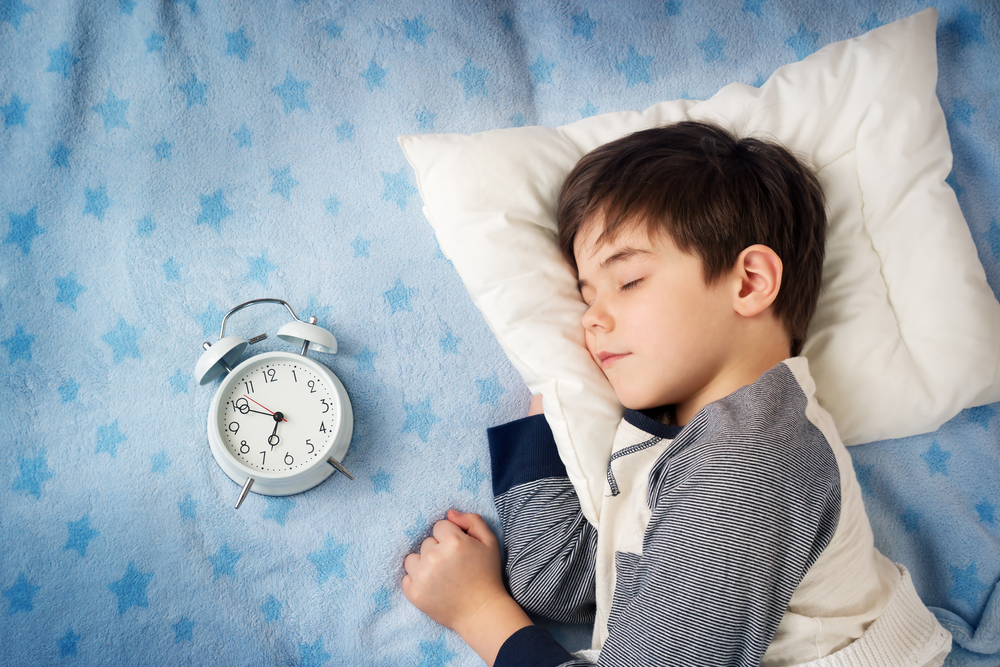Sleep is not just rest — it’s a crucial time when a child’s body grows, the brain processes learning, and emotions reset. Healthy sleep habits are linked to better mood, stronger immunity, improved attention, and even academic success. Unfortunately, many children today face disrupted sleep patterns due to busy schedules, screen time, or irregular routines.
By understanding the science of sleep and building healthy habits early, parents can help their children fall asleep faster, stay asleep longer, and wake up refreshed.
How Much Sleep Do Kids Need?
The amount of sleep a child needs changes as they grow:
- Infants (4–12 months): 12–16 hours (including naps)
- Toddlers (1–2 years): 11–14 hours (including naps)
- Preschoolers (3–5 years): 10–13 hours
- School-aged children (6–12 years): 9–12 hours
- Teens (13–18 years): 8–10 hours
These numbers come from the American Academy of Sleep Medicine and should be considered guidelines — individual needs may vary. The goal is for your child to wake up naturally, without feeling groggy or irritable.
Common Sleep Challenges for Kids
Even with the best intentions, kids can experience sleep problems. Some common issues include:
- Resistance to bedtime (“Just five more minutes!”)
- Night waking or trouble falling back asleep
- Nightmares or night terrors
- Overstimulation from screens or activities
- Sleep anxiety — fear of being alone or missing out
While occasional disruptions are normal, persistent sleep struggles can affect health, mood, and school performance.
Building Good Sleeping Habits for Kids
Healthy sleep habits are learned, not automatic. Here are key strategies parents can use to help children develop strong, consistent sleep routines:
- Set a Consistent Sleep Schedule
The human body thrives on regularity. Going to bed and waking up at the same time every day — even on weekends — helps regulate a child’s internal clock. This makes it easier for them to feel sleepy at bedtime and wake up naturally in the morning.
- Create a Relaxing Bedtime Routine
A predictable wind-down routine signals to the body that it’s time to sleep. This might include:
- Taking a warm bath or shower
- Changing into comfortable pajamas
- Reading a calming book together
- Listening to soft music or white noise
Avoid exciting activities or arguments right before bed — they can spike adrenaline and delay sleep.
- Limit Screen Time Before Bed
The blue light from phones, tablets, and TVs suppresses melatonin, the hormone that makes us sleepy. Experts recommend turning off screens at least one hour before bedtime and keeping devices out of the bedroom entirely.
- Make the Bedroom Sleep-Friendly
The sleeping environment should be comfortable, dark, quiet, and cool (around 65–70°F). Blackout curtains, white noise machines, or a favorite stuffed animal can make the space more relaxing.
- Encourage Daytime Activity
Physical activity during the day helps children fall asleep faster and enjoy deeper sleep at night. Outdoor play also supports healthy circadian rhythms thanks to natural light exposure.
- Watch Diet and Caffeine Intake
Heavy meals, sugary snacks, and caffeinated drinks (like soda or iced tea) close to bedtime can interfere with sleep. Offer a light, healthy snack if needed — something like a banana or warm milk.
- Address Stress and Anxiety
Some children have trouble sleeping because they’re worried or overstimulated. Talking about their day, practicing deep breathing, or using relaxation exercises can help calm their mind before bed.
When to Seek Professional Help
If your child consistently has trouble sleeping, snores loudly, experiences breathing pauses, or shows signs of extreme daytime sleepiness, it’s important to talk to a pediatrician. Sleep disorders like sleep apnea, restless legs syndrome, or chronic insomnia can affect children, too, and may require medical intervention.
Teaching Lifelong Sleep Skills
One of the best gifts you can give your child is the ability to self-soothe and fall asleep on their own. Avoid always rocking, feeding, or lying down with them until they fall asleep — instead, gradually encourage independence. Over time, these habits can help them maintain healthy sleep well into adulthood.
Quick Sleep Checklist for Parents
- ☐ Consistent bedtime and wake-up time
- ☐ Screen-free hour before bed
- ☐ Relaxing wind-down routine
- ☐ Comfortable, cool, and quiet bedroom
- ☐ Regular daytime physical activity
- ☐ Healthy diet with limited caffeine
- ☐ Emotional check-in before sleep
Conclusion: Sleep Is a Family Priority
Good sleeping habits for kids don’t just happen — they are built through consistency, patience, and a supportive environment. By setting routines, creating a calm atmosphere, and making sleep a family priority, you can help your child enjoy the full benefits of restorative rest.
Better sleep means better moods, sharper thinking, stronger health, and happier mornings — for both kids and parents.
READ MORE: Do Kids Really Need A Multivitamin?
Sources:
https://www.nkchealth.org/blog/less-screen-time-is-key-to-better-sleep-in-kids
https://www.cdc.gov/sleep/about/index.html
https://kidshealth.org/en/parents/sleep-hygiene.html
https://wellself.com/inappropriate-internet-usage-how-increased-screen-time-is-affecting-children/









